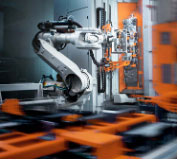Bridging physical and digital worlds to redefine industrial operations.
By Michael Weller, Practice Leader of Manufacturing, Energy, and Utilities at Verizon Business

The factory floor has long been a treasure trove of untapped data. However, that information was often siloed, inaccessible or too slow to be useful. This is changing rapidly with the rise of 5G, edge computing, and Internet of Things (IoT), enabling industries to harness data more effectively, setting new benchmarks for efficiency, safety, and productivity. By 2025, manufacturing, energy, and utilities are poised for a significant digital transformation.
IoT is driving the transformation of industries rooted in physical environments, particularly manufacturing. The proliferation of IoT devices is creating a hyper-connected ecosystem that generates vast amounts of data, turning factories into dynamic hubs of continuous information flow. Emerging technologies such as augmented reality (AR), virtual reality (VR), video analytics, and digital twins are amplifying this shift. While demanding significant computational power, these technologies are unlocking new possibilities, including remote monitoring, predictive analytics, and more informed decision-making.
One of the most transformative applications is the use of digital twins—virtual replicas of physical assets. Combined with AI, AR, and VR, digital twins enable predictive maintenance and proactive issue identification. Technicians can now detect problems remotely and in real-time, reducing downtime and improving efficiency. Historically, diagnosing malfunctioning equipment was time-consuming and often required extensive repairs. Today, digital twins and predictive analytics allow for proactive identification of potential failures, minimizing downtime and helping improve worker safety.
AI and machine learning (ML) are key enablers of these advancements, driving innovations in both factory operations and supply chain management. In manufacturing, AI enhances machine vision, improving the precision of automated systems and robotic guidance. Real-time data analysis helps robots execute tasks more efficiently, boosting productivity and safety.
In supply chain management, AI offers critical solutions to anticipate and mitigate disruptions. Geopolitical instability and supply chain bottlenecks can cause delays and financial losses. AI-powered predictive analytics enable manufacturers to forecast demand and adjust operations accordingly, helping reduce risk and production delays.
Consider the global electronics assembly industry, which relies heavily on regions such as East Asia for semiconductor production and Eastern Europe for neon, a crucial material for semiconductor chip production. Geopolitical conflicts or natural disasters in these areas can severely disrupt global supply chains. By analyzing global data trends and supply chain vulnerabilities, AI empowers manufacturers to adjust strategies proactively, minimizing the impact of such disruptions.
In parallel to AI, blockchain technology is emerging as a vital tool for enhancing supply chain transparency and traceability. By securely tracking and verifying the movement of goods, blockchain ensures ethically sourcing and fosters transparency across the supply chain. This technology also strengthens product authenticity, builds customer trust, and helps manufacturers meet regulatory and sustainability standards.

The true potential of smart manufacturing and optimized supply chains depends on the seamless integration of 5G and edge computing. 5G provides high-speed, low-latency connectivity, while edge computing enables localized data processing. Together, these technologies enable real-time analytics, predictive maintenance, and other computationally intensive tasks critical for smart factories and supply chain management.
When manufacturing processes require vast amounts of data to be processed quickly, relying on centralized cloud computing can introduce latency. Edge computing, by processing data closer to the source—on the factory floor or within local networks—helps ensure decisions can be made in real-time which can improve operational efficiency and safety. Without these technologies, the benefits of IoT, AI, and digital twins would be limited, as the infrastructure needed to support such data-heavy processes may be insufficient.
Industries such as manufacturing, energy, and utilities were initially slower to adopt digital technologies compared to other sectors. However, as the advantages of IoT and other emerging technologies become undeniable, these industries are accelerating their digital transformations. The primary barrier – demanding processing power – is steadily being overcome.
With the widespread rollout of 5G and edge computing, industries can now harness the power of these technologies at scale. 2025 may see more factories and supply chains integrate digital tools, the pace of innovation will accelerate, giving rise to a more integrated, smart industrial ecosystem. As manufacturers, energy providers, and utilities connect physical assets to digital networks, we will see a wave of new efficiencies, safety enhancements, and productivity gains, transforming the way industries operate.

About the Author:
Michael is the Practice Leader for Verizon’s Manufacturing, Energy and Utilities team at Verizon Business. Michael’s group drives strategic business development and industry engagement for Verizon Business’ customers in these vertical markets.
Scott Ellyson, CEO of East West Manufacturing, brings decades of global manufacturing and supply chain leadership to the conversation. In this episode, he shares practical insights on scaling operations, navigating complexity, and building resilient manufacturing networks in an increasingly connected world.